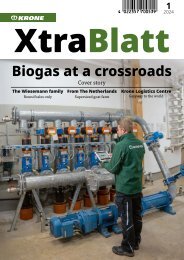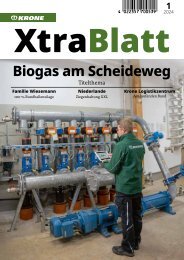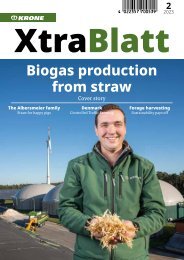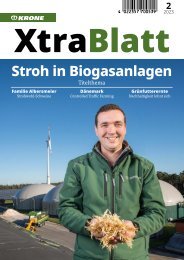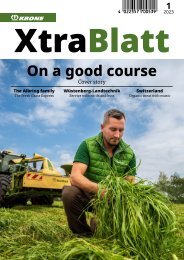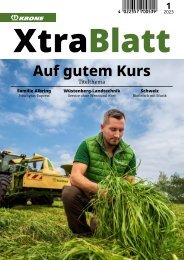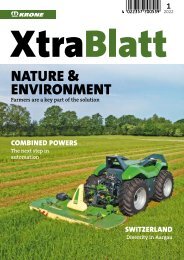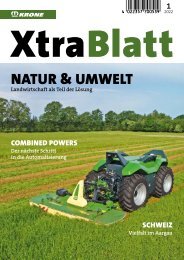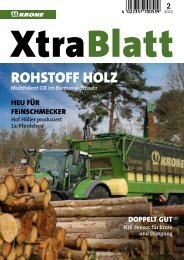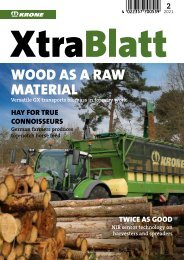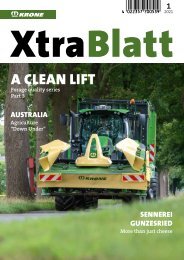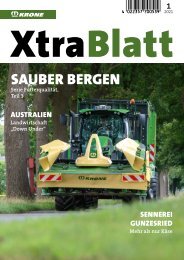XtraBlatt Issue 02-2020
Create successful ePaper yourself
Turn your PDF publications into a flip-book with our unique Google optimized e-Paper software.
ON-FARM<br />
4<br />
1<br />
3<br />
and mainly comprises premium makes and<br />
specialised machinery. “This we certainly<br />
need”, says Heinrich Meusel, “because under<br />
our production and working conditions,<br />
material wear and tear is very high.”<br />
SAFECUT HELPS<br />
Heinrich Meusel nowadays produces hay for<br />
household pets from 120 ha. Several Krone<br />
mowers are used. “The SafeCut system was<br />
behind the decision to go for this make”, he<br />
continues. “Beforehand, many of my fields<br />
had lain fallow. This leaves a field surface<br />
that can provide unpleasant surprises for<br />
the mower operator. SafeCut helps avoid<br />
damage under such conditions. But even<br />
when a roll pin shears, it can be replaced<br />
on the field in just a few minutes.” Heinrich<br />
Meuser has also experimented with double<br />
knife cutterbar, although not too successfully.<br />
His field surfaces often have sudden<br />
ups and downs. Revolving knives therefore<br />
work better.<br />
As a rule, the mower is immediately followed<br />
by the tedder for quick drying, with<br />
a repeat on day two. Sometimes the hay<br />
has to be turned again on the third day<br />
before swathing – all with machinery from<br />
Spelle. For baling, small bales are favoured<br />
at 80 cm and 1.9 to 2.0 m length with under<br />
16 % moisture content. To spread out any<br />
labour peaks, a round baler is often sent<br />
into smaller fields as early as the second<br />
day. These bales then go into the farm’s barn<br />
drying plant. The same applies to hay carted<br />
home early because of rain.<br />
TRACEABLE<br />
2<br />
This farmer works with high performance<br />
transport capacity. “Not so long ago I invested<br />
in a bale trailer with hydraulic load<br />
securing”, he explains. “This is a real advantage.<br />
We no longer need to fiddle around<br />
with tension belts. It saves time and is much<br />
safer, especially evenings with the last loads<br />
of the day after sunset. We load the trailers<br />
with front loader and for unloading we use<br />
a compact telescopic loader. Traceability<br />
entails precisely recording which fields each<br />
load comes from and where the bales are<br />
stored. I work with a special food standard<br />
IT system. Every package of pet feed is<br />
stamped with a traceability code.”<br />
The automatic packaging system is sited in<br />
the farm buildings. Firstly, the bales go into<br />
a shredder with sieve system, then by conveyor<br />
belt into the actual packaging plant.<br />
Each portion of appropriate weight is first<br />
pressed into a form and then pushed into<br />
plastic wrapping. The packages are further<br />
packed into cartons and palleted ready<br />
for road transport. “It took quite a while<br />
before the packaging plant ran smoothly”,<br />
recalls Heinrich Meusel. “It has a highly<br />
complicated management technology and<br />
many adjustments were necessary. Even<br />
nowadays, my workers and I are continually<br />
1 For “Hay Heinrich”, additional business<br />
enterprises feature landscape<br />
conservation, forestry and advisory<br />
services.<br />
2 Thuringian rural entrepreneur Heinrich<br />
Meusel: widely known as “Hay<br />
Heinrich”.<br />
3 Special machinery is applied on the<br />
sometimes very steep slopes.<br />
4 The hay is harvested conventionally.<br />
But important for Heinrich Meusel is<br />
that the sward contains a high content<br />
of valuable herbs.<br />
making corrections. The plant runs yearround<br />
in two shifts per day.”<br />
BIO-CERTIFIED<br />
The hay fields are mostly on steep slopes<br />
and usually just one cut a year is made.<br />
“In order to encourage herb growth in the<br />
sward, we tine harrow each spring. Our<br />
USP (unique selling point) is that all our<br />
hay areas are certified as organically managed<br />
and that we produce real mountain<br />
meadow hay including valuable herbs such<br />
as spignal, yarrow and arnica”, points out<br />
Heinrich Meusel. “Most of our competitors<br />
sell only dried grass. Until we could really<br />
convince customers, I had to carry out lots<br />
of persuasion work, have plenty information<br />
at hand and carry out intensive discussions<br />
with end customers. There was, and still is,<br />
tremendous effort required in marketing,<br />
advertising and sales. I never set out to sell<br />
on price. Instead, I concentrate on quality.<br />
But now we have a good customer base<br />
and are listed by big chains e.g. Rewe,<br />
Kaufland and Tegut. Admittedly, there are<br />
still problems, for instance meeting delivery<br />
requirements in some cases, and the<br />
associated logistics. But the trade lays down<br />
the rules and we follow them. This gives us<br />
delivery conditions that are generally very<br />
stable.”<br />
Because, meantime, demand has overtaken<br />
own production, this farmer has founded<br />
the Thuringia Hay Exchange. Project partner<br />
is the region’s Landscape Conservation Association<br />
that collects suitable hay from growers.<br />
Quality is strictly controlled according to<br />
an official catalogue and the results govern<br />
payment. Deliveries now not only go to Hay<br />
Heinrich but to other customers, including<br />
riding stables. “What I’m especially pleased<br />
about is that there’s a good community<br />
feeling developed amongst our hay makers,<br />
and now we’re working together in other<br />
respects.”<br />
MANY IDEAS<br />
“The hay harvest lasts around one and<br />
a half months. And to better exploit my<br />
investment in special machinery I’ve started<br />
other enterprises: landscape conservation,<br />
forestry services and associated advisory<br />
work”, adds Heinrich Meusel. “Our business<br />
spectrum is therefore varied. In forestry<br />
work, for instance, it stretches from tree<br />
planting over fence building through to<br />
timber extraction. In landscape conservation<br />
there’s a lot of classic mowing work<br />
in difficult to access locations, but also<br />
renaturation, and stabilising of steep<br />
slopes. For the latter work I’ve developed<br />
a special procedure involving strands of<br />
hay. Particularly in the service sector, I’ve<br />
invested considerably in the last years. Since<br />
the beginning of this year we are using our<br />
own ‘walking excavator’, a backhoe that<br />
moves on hydraulic legs. Extra attachments<br />
for this are a mulching head and hydraulic<br />
tree shear. A forest tractor with crane and<br />
rear bogey are to be delivered next.”<br />
Ideas just keep on flowing from this young<br />
farmer and entrepreneur. He’s further<br />
processing the valuable flowers from his<br />
hay meadows for use in cosmetics. A farm<br />
shop to sell the ensuing products is just now<br />
being completed. And because environment<br />
and landscape conservation are not only a<br />
business for him but a real mission, he’ll<br />
doubtless soon have interesting new projects<br />
in this sector too. «<br />
48 49



